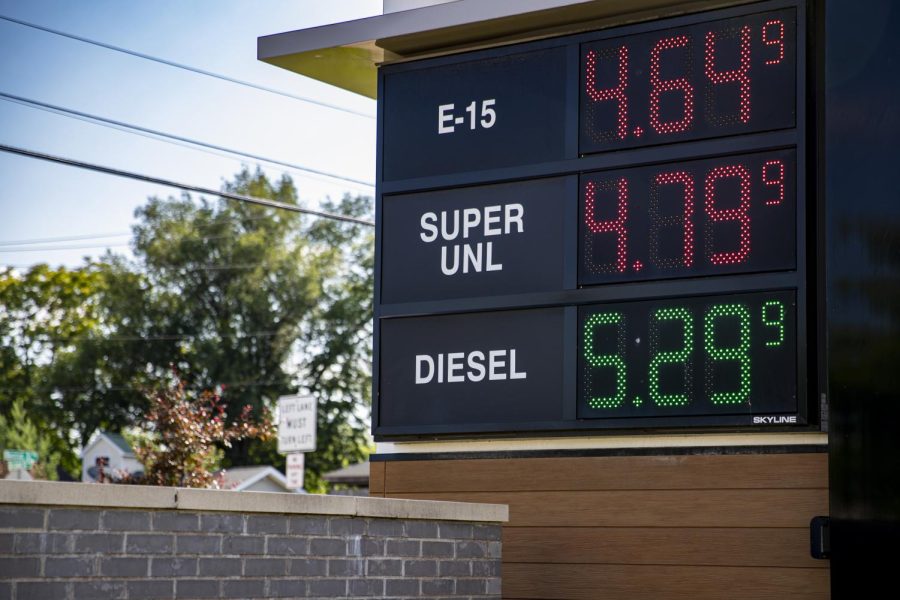Opinion | Gas prices explained
Economic conditions greatly influence the price of gas.
Gas prices are displayed at a gas station in Iowa City on Monday, June 27, 2022.
June 28, 2022
Contrary to what Republicans and certain progressive politicians would have voters believe, President Joe Biden does not have a dial on his desk that he can turn to lower gas prices. Truth be told, American oil companies also do not have a monopoly on the price of gas. So, why is it that gas prices are so high?
This seemingly simple question can be answered by analyzing the geopolitical landscape of oil production, causing actors in both the oil and gas markets to raise gas prices
The reason it is important to understand the mechanisms of the crude oil market when discussing gas prices is that crude oil serves as the basic input for making gas. Thus, the price of gas tends to go up when the price of crude oil goes up.
Economists would consider the oil market to be a classic example of a cartel, meaning oil-producing states maintain prices at a high level and restrict competition. The Organization of the Petroleum Exporting Countries (OPEC +), are economies heavily dependent on crude exports, providing over 50 percent of the world’s crude oil supply.
Because of this market domination, countries in OPEC + collude to set oil prices for the rest of the world and the actions these countries take can have dire consequences for the price of the commodity.
Take, for instance, Russia, a member state of OPEC +. Russia, wanting to live out its old dreams of being an imperial power, is currently waging a brutal war in Ukraine.
Long story short, this blatant act of stupidity galvanized the European Union and the U.S. into sanctioning the Russian petrostate. Russia, being Europe’s number one source of crude oil, retaliated by cutting off oil to European markets. This situation is made worse by the fact that the other major petrostates in OPEC + are also ruled by idiotic despots.
As a result, they refused to amp up production to offset Russia cutting off Europe from its oil markets. Thus driving up the price of crude oil to $107 per barrel in the U.S. and $113 per barrel in Europe, Africa, and the Middle East.
However, it should be noted that the price of oil doesn’t necessarily always reflect the price of gas. After all, in 2014 when the price of oil was trading for around $95 per barrel, Americans were not paying what they are paying for gas now.
For example, in Iowa, gas prices were trading at around $3.25 when crude was trading that high in 2014. Now, gas in the state is $4.64.
This is because the tumult in crude oil markets only explains half of the story.
The second part of understanding this problem is to look at the refinery industry, the set of firms responsible for converting oil into gasoline.
In the U.S., refinery capacity is 5 percent below 2020 levels, as many refinery plants have closed, thus putting extra strain on existing refineries. Furthermore, it does not help that Russia is one of the largest exporters of refined gasoline. For reasons similar to why Russian crude is not being exported anymore, Russian gas is also not making it to markets.
Therefore, as the basic laws of supply and demand indicate, as the supply of refined gas decreases, the price of refined gas increases.
The simple solution to this problem would be to encourage more companies to drill. Unfortunately, because of the obviously detrimental fact that drilling for more crude oil would increase the speed of climate change, this is not a viable political option for the Biden Administration.
There is the route of fracking for shale which is cleaner than crude, but it is still a fossil fuel.
Eventually, what is going to lower gas prices is the collective effort of central banks across the globe to raise interest rates to the point where consumers are discouraged from spending a ton of money on gasoline. This will inevitably decrease demand for gas and thus lower the price of the commodity that Americans love more than cheeseburgers.
Columns reflect the opinions of the authors and are not necessarily those of the Editorial Board, The Daily Iowan, or other organizations in which the author may be involved.














